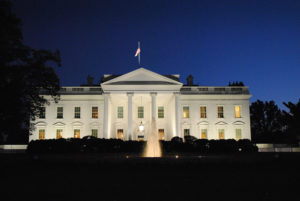Where Will the Biden Administration Take Title IX?
 Photo by Tabrez Syed on Unsplash
Photo by Tabrez Syed on Unsplash Last month, President Biden declared April 2021 as National Sexual Assault Awareness Month. The dedication is to honor the strength and resilience of survivors and advocates, as well as to promote commitment from schools, organizations, and other groups to work toward a society where every person is free from sexual violence. The proclamation mentions that the fight for justice requires the changing of laws, but also a change in culture, where both themes intersect to create safe environments for all.
College-aged students are at an elevated risk of sexual assault compared to all other age groups, with these types of crimes prevalent on college campuses. As institutions that receive federal funding, colleges are required to follow the guidelines of Title IX, a statute enforced by the U.S. Department of Education’s Office of Civil Rights, which states:
“No person in the United States shall, on the basis of sex, be excluded from participation in, be denied the benefits of, or be subjected to discrimination under any education program or activity receiving Federal financial assistance.”
Contention has swirled around the law since the Obama Administration released clarifying guidance documents in 2011 and 2014. Both advisories made it a requirement to increase the breadth of investigations to “any unwelcome conduct of sexual nature.” Protective measures were put in place by concealing the identities of witnesses and allowing accusers to not have to confront the accused in person. Advocates praised the advisories, as they offered more protection to survivors and took into account the trauma survivors face in the process of finding legal justice. The Obama Administration’s guidance did face some backlash, as critics stated that the new regulations did not allow for a fair and equal trial.
In retaliation to the Obama Administration’s guidance, Betsy DeVos—the Trump Administration’s Secretary of Education—rewrote the Title IX rules at the beginning of the pandemic last year. As colleges were scrambling to transition to remote learning and faced with the looming economic and health consequences of the coronavirus pandemic, the new and final regulations were released. Colleges and universities across the country felt overloaded as they tried to adjust to the pandemic, as well as the “complex and challenging” regulations now at hand.
The regulations put in place last year intended to give the accused a fairer trial process and restricted what cases could be considered under Title IX due to the location of assaults. This left survivors and accusers less protected. Even though 63 percent of sexual assaults are never reported, and false accusations are extremely low, supporters were pleased to see that the accused would have the opportunity for a fairer due process. Victims face trauma and a range of emotions after incidents, as reporting or disclosing abuse can be extremely difficult. Critics claim that more intense Title IX reporting requirements will reinforce this, so survivors will be less willing to come forward and follow through.
The current Department of Education’s Office for Civil Rights recently announced its planned comprehensive review of former Secretary DeVos’ Title IX rewrite. In a letter to students, teachers, and other stakeholders, the Biden Administration detailed its intent to create “an educational environment free from discrimination on the basis of sex, including discrimination in the form of sexual harassment, which encompasses sexual violence.” The Department plans on gathering the public’s insights on how to proceed to create a safe environment for all. After gathering information and opinions from the public, the administration will then review all existing documents and decide what must be revised and rewritten to keep students safe.
Last year, DeVos attacked the civil rights of sexual assault survivors. The Biden administration now has the opportunity to rewrite policy to work toward a goal of creating a society where all feel safe from sexual violence. Their plan will most likely lean back towards Obama-era regulations. Yet, it is uncertain whether the administration will try to find a middle ground or fall back to Obama-era regulations that have greater contention but more protection.
The dedication of Sexual Assault Awareness Month reminds us to reflect, support, and advocate for victims. With policy and advocacy intertwined, we can work towards a time when sexual violence is publicly condemned, and survivors effectively supported.
